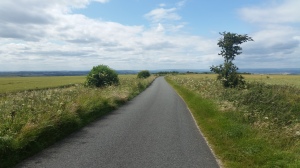 Cycling’s most potent mythology is best signified by the death of Tom Simpson: continuation past the point where the returns diminish to zero or less is admired by many even where it is frankly pathological. In order to meet the demands of this myth, it is no surprise that some resort to doping, or make other physically or mentally disastrous decisions. As riders prepare hopefully for Paris Brest Paris, the Race Across America or the Transcontinental (starting tonight in Belgium) they probably hope that they will not have to go beyond the bounds of rationality to finish, but by the very nature of even the shortest of these challenges (no longer a race) demands a suspension of belief even for repeat entrant. The exposure of the body to such sustained repetitive action is unpredictable but always extreme, and even the least imaginative of riders will know that they will have to proceed beyond any normal definitions of plausibility. Such prospective irrationality only gets worse as a rider accumulates time and distance leading to bizarre and sometimes catastrophic failures which could be minimised by stopping hours or days earlier. However, it is almost impossible to judge whether continuing is rational or not: when even starting goes against common sense, how can one decide when to stop? Riders’ accounts demonstrate that successful completion can come despite all the signals to stop, and for supported rides the rider’s team are often better judges, making their decisions based upon more rational bases. Even support teams, however, can suffer from the sunk loss fallacy. If continuing past an obstacle brings failure there is no advantage in continuing, yet riders continue until they fall asleep whilst riding (and crash), ignore injuries that will eventually lead to abandoning, or carry on rising despite the unlikely average speed required to meet a time limit. As the distance increases so does the investment, and the magnitude of the potential loss. Of course, the paradox is that it is incredibly hard to tell where the threshold between a reasonable decision to continue and abandonment lies. Viewed from outside the world of the long distance racer Josh Ibbet’s decision-making on the way to his second place in last year’s Transcontinental looks foolhardy. Judged purely on outcome, however, his decision to ride through pain and exhaustion was successful (if costly). If such decisions were made on irrational grounds, and merely to avoid discarding sunk costs, that hardly matters unless you permanently injure yourself… as long as you make your goals. As an aside, the result of abandoning the investment one has made can be a transfer of that energy into surprising alternate goals. Martin Cox’s extraordinary decisions to transfer his energies from racing to cleaning up the Stelvio and helping out an injured companion of the road are examples of constructive ways of dealing with what might otherwise look like losses.
Cycling’s most potent mythology is best signified by the death of Tom Simpson: continuation past the point where the returns diminish to zero or less is admired by many even where it is frankly pathological. In order to meet the demands of this myth, it is no surprise that some resort to doping, or make other physically or mentally disastrous decisions. As riders prepare hopefully for Paris Brest Paris, the Race Across America or the Transcontinental (starting tonight in Belgium) they probably hope that they will not have to go beyond the bounds of rationality to finish, but by the very nature of even the shortest of these challenges (no longer a race) demands a suspension of belief even for repeat entrant. The exposure of the body to such sustained repetitive action is unpredictable but always extreme, and even the least imaginative of riders will know that they will have to proceed beyond any normal definitions of plausibility. Such prospective irrationality only gets worse as a rider accumulates time and distance leading to bizarre and sometimes catastrophic failures which could be minimised by stopping hours or days earlier. However, it is almost impossible to judge whether continuing is rational or not: when even starting goes against common sense, how can one decide when to stop? Riders’ accounts demonstrate that successful completion can come despite all the signals to stop, and for supported rides the rider’s team are often better judges, making their decisions based upon more rational bases. Even support teams, however, can suffer from the sunk loss fallacy. If continuing past an obstacle brings failure there is no advantage in continuing, yet riders continue until they fall asleep whilst riding (and crash), ignore injuries that will eventually lead to abandoning, or carry on rising despite the unlikely average speed required to meet a time limit. As the distance increases so does the investment, and the magnitude of the potential loss. Of course, the paradox is that it is incredibly hard to tell where the threshold between a reasonable decision to continue and abandonment lies. Viewed from outside the world of the long distance racer Josh Ibbet’s decision-making on the way to his second place in last year’s Transcontinental looks foolhardy. Judged purely on outcome, however, his decision to ride through pain and exhaustion was successful (if costly). If such decisions were made on irrational grounds, and merely to avoid discarding sunk costs, that hardly matters unless you permanently injure yourself… as long as you make your goals. As an aside, the result of abandoning the investment one has made can be a transfer of that energy into surprising alternate goals. Martin Cox’s extraordinary decisions to transfer his energies from racing to cleaning up the Stelvio and helping out an injured companion of the road are examples of constructive ways of dealing with what might otherwise look like losses.
What does any of this have to do with me? I sank time, money, effort and spirit into my attempt to ride Paris Brest Paris this year. I prepared well, and pre-qualified last year to get an early entry by completing my first Super Randonneur series in 2014. And yet I gave up on my final qualifying ride of 2015, unlike @fabiorandonneur, who endured many challenges and qualified last minute by completing a 400 under extremely painful circumstances. I overslept in the night after a very bad run from Castleford to Mytholmroyd and completely lost my will to continue. Although officially out of time I could have tried to continue with the hope of catching up on the rather flatter final 225 km of the East and West Coasts 600, but after about 10 km of grovelling into a headwind I returned home and slept for about 18 hours on and off. It wasn’t supposed to end this way, but after tears came resignation and the memory of an enjoyable first section before I collapsed in the night.
tears came resignation and the memory of an enjoyable first section before I collapsed in the night.
The story didn’t end there, however. Unlike Martin Cox I didn’t manage to sublimate my drive into anything selfless. I did, however, complete a similar route last weekend in 37 hours (validated by GPS), an hour quicker than last year, to complete my SR series for 2015. It was alone, unsupported and beautiful, leading to no glory in Paris, but the return on my investments was just right, thank you, including fish and chips at 500 km.
Follow the much more invested riders of the Transcontinental, including Martin Cox on his second attempt, here:

Interesting. Is TransCon using http://trackleaders.com/ again this year? Would like to follow Juliana and Emily if possible.
Yes – there is a link from the race website…
Thanks! Looks like only 3 women are in.
Oops, looks like 4: Juliana, Emily, Sarah and Elena Solomides (who is a new name for me). Also a few women in the pairs, which is great to see.